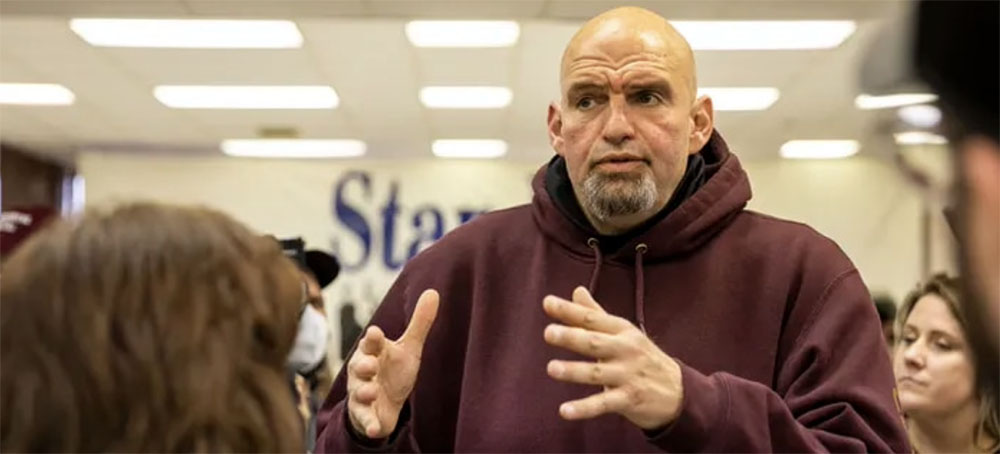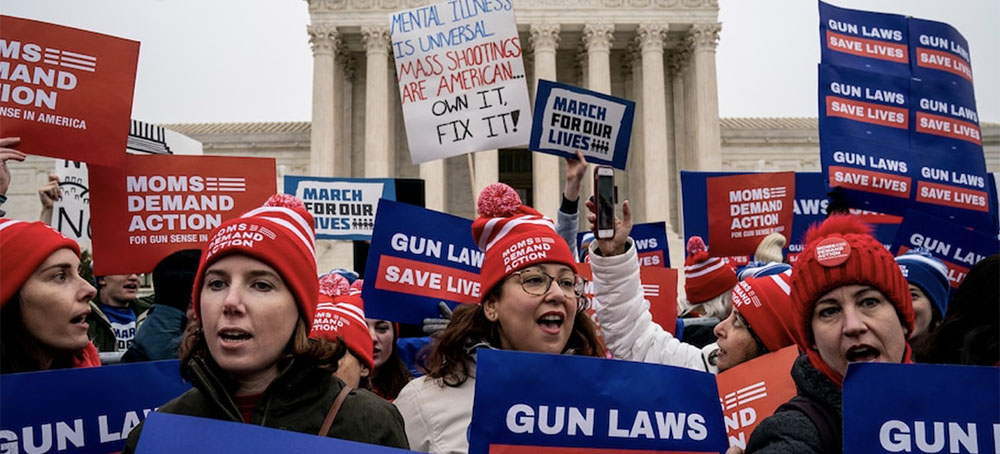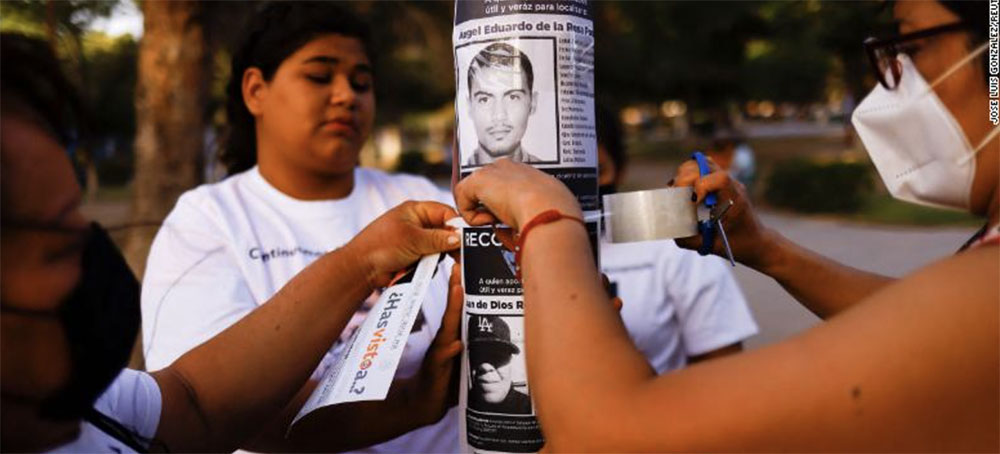Live on the homepage now!
Reader Supported News
In 2017, Donald Trump repeatedly lied that between 3 and 5 million unauthorized immigrants had voted for Hillary Clinton. In the last few weeks, Trump has resurrected his lie during campaign rallies for the Republican primary candidates he has endorsed — whipping up fears of “open borders and horrible elections,” and calling for stricter voter ID laws and proof of citizenship at the ballot box.
Trump endorsees have been amplifying the lie. J.D. Vance, the Trump-backed winner of last week’s Ohio Republican Senate primary, claimed that President Biden’s immigration policy has resulted in “more Democrat voters pouring into this country.”
In fact, voter fraud is exceptionally rare, and claims that widespread numbers of undocumented immigrants are voting have been repeatedly discredited.
There is a problem of foreigners influencing American elections, however — a problem that has nothing to do with immigrants or fraudulent voting.
The problem is foreign money flowing into U.S. campaigns.
Some of the flow is illegal. Last October, Lev Parnas, a Florida businessman who helped Rudy Giuliani’s effort to dig up dirt on Joe Biden in Ukraine, was convicted of funneling a Russian entrepreneur’s money to U.S. politicians.
The real scandal is how much foreign money flows into U.S. elections legally.
The Supreme Court’s 2010 decision in Citizens United v. Federal Election Commission opened the gates. It allows foreigners to influence U.S. elections through their investments in politically active American corporations.
The (then) five-justice conservative majority said that when it comes to political speech, the identity of the speaker is irrelevant, and that more speech is always better. In dissent, Justice John Paul Stevens argued that the logic of the Court’s ruling would allow foreign spending on American elections, threatening American interests. Stevens was right. If the identity of the speaker doesn’t matter and more speech is always better, what’s to stop foreign spending on U.S. elections?
Non-Americans whose money is now flowing into American campaigns — mostly into those of Republican candidates — include Russian oligarchs, the Saudi royal family, European financiers, Chinese corporate conglomerates, and many other people and organizations that owe their allegiance to powers other than the United States.
This growing problem emerges from three realities:
First, foreign investors now own a whopping 40 percent of the shares of American corporations. That’s up from just 5 percent in 1982.
Second, American corporations are spending hundreds of millions of dollars to influence elections — not counting their separate corporate political action committees or personal donations by executives and employees. Much of this spending is through dark money channels that opened after the Citizens United decision.
Third, by law, corporate directors and managers are accountable to their shareholders, including foreign shareholders — not to America. As the then-CEO of U.S.-based Exxon Mobil Corp. unabashedly stated, “I’m not a U.S. company and I don’t make decisions based on what’s good for the U.S.”
The second and third of these points pose substantial threats to American democracy on their own. Add in the first, and you’ve got a sieve through which non-Americans — whose interests don’t necessarily correspond to the interests of the United States — assert growing influence over American politics.
Follow the money. In recent years, Russian billionaire oligarchs have owned significant amounts of Facebook, Twitter, and Airbnb. Saudi Arabia owns about 10 percent of U.S.-based Uber and has a seat on its board.
Many of America’s largest corporations with substantial foreign ownership (including AT…T, Comcast, and Citigroup) have contributed millions of dollars to the Republican Attorney Generals Association, which in turn bankrolled the pro-Trump rally on the morning of the January 6 insurrection.
What to do about this? The Center for American Progress has a sensible proposal: It recommends that no U.S. corporation with 5 percent or more of its stock under foreign ownership or 1 percent or more controlled by a single foreign owner be allowed to spend money to sway the outcomes of U.S. elections or ballot measures. Corporate governance experts and regulators agree that these thresholds capture the level of ownership necessary to influence corporate decision-making.
Okay, but how to get this proposal enacted, when big American-based corporations with significant foreign investment have so much influence over Congress?
Democrats should make this an issue in the run-up to the 2022 midterms. While Republicans rail against the utterly fake danger to the United States of undocumented immigrants voting in American elections, Democrats should rail against the real danger to American democracy of foreign money affecting American elections through foreign investments in American corporations.
What do you think?
 Pennsylvania Lt. Gov. John Fetterman, now the Democratic nominee for Senate, during a campaign stop last month in Plymouth Meeting. (photo: Tyger Williams/Inquirer)
Pennsylvania Lt. Gov. John Fetterman, now the Democratic nominee for Senate, during a campaign stop last month in Plymouth Meeting. (photo: Tyger Williams/Inquirer)
ALSO SEE: Summer Lee Narrowly Leads Steve Irwin but Congressional Race
Still Too Close to Call
Fetterman’s unconventional style helped propel his victory and represents something of a departure from years of Democratic voters in Pennsylvania nominating more centrist candidates.
Fetterman, who entered the race as the Democratic front-runner early last year and only grew his advantage over time, had about 52% of the expected total votes as of late Tuesday night.
He will face the winner of a Republican primary that was still too early to call late Tuesday, in one of the most critical Senate races in the country. In that GOP primary, celebrity surgeon Mehmet Oz held a narrow lead over former hedge fund CEO David McCormick after trailing most of the night. Conservative commentator Kathy Barnette, after a late surge in the race that shocked Republican insiders, was trailing McCormick and Oz.
As returns rolled in, Fetterman was in a Lancaster hospital, where he was recovering from a stroke he suffered just four days before the primary. His campaign said Tuesday that he underwent a procedure to get a pacemaker to regulate his heart rate.
The campaign, which didn’t respond to several requests to interview Fetterman’s doctors, has said doctors reversed the stroke in time to prevent any cognitive damage, and that he’s expected to make a full recovery. Fetterman voted via emergency absentee ballot Tuesday and is expected to remain in the hospital for several days.
Without him, a crowd of supporters and his wife, Gisele, celebrated at an election-night rally at an airport hotel here.
“This race we’re running, it’s a race for the future of every community across Pennsylvania,” she said. “For every small town, for every person who calls those small towns home and for every person who’s considered leaving because they didn’t see enough opportunities. … It’s a race for a better Pennsylvania and for a better country.”
The crowd erupted in cheers as MSNBC called the race for him shortly before 9 p.m. They waved yellow Fetterman towels in the air and jumped up and down.
“I have goose bumps right now,” said Phil Heasley, 31, of Butler, a Fetterman campaign volunteer. “This is someone who always showed up for us, and now it’s our time to show up for him. It’d be great if he were here, but we’re gonna raise the roof as if he was.”
Fetterman appeared on the big screen briefly, from the hospital, saying simply: “Thank you so much for everything. From my heart, thank you for everything.”
“How cute is he?” Gisele Fetterman asked after the cameo.
She spoke about her husband’s unconventional style, which attracted so many to his campaign.
“It’s not just that John looks nothing like a politician,” she said. “It’s because John doesn’t act like one. At heart, he’s still that hardworking, scrappy, small-town mayor.”
Gisele Fetterman later told reporters her husband’s health should not be an issue.
”I think anyone who would imply that he would be unfit to serve because of this procedure is also ... offending millions of Americans who have pacemakers,” she said.
”And it’s almost ableist, you know? I think he’s going to have a full, thriving life. He’s going to be able to do the same work as anyone else,” she said. “But the reality is, families come with health scares. That is a very American thing. What he’s gonna want to fight for is to make sure that everyone would have access to the same care that he was able to receive.”
Fetterman’s unconventional style helped propel his victory and represents something of a departure from years of Democratic voters in Pennsylvania nominating more centrist candidates. U.S. Rep. Conor Lamb, who campaigned as a moderate Democrat in the mold of President Joe Biden, was in second-place late Tuesday. With about 87% of the total expected votes counted, Lamb had about 23% of the vote, while State Rep. Malcolm Kenyatta had 8%.
The victory makes Fetterman the Democratic standard-bearer in one of the most hotly contested races in the country, which could determine control of the chamber. The incumbent Republican, Sen. Pat Toomey, isn’t seeking reelection.
Fetterman, 52, began drawing national notice as mayor of Braddock, a small Rust Belt town outside Pittsburgh. He ran an unsuccessful campaign for Senate in 2016, and then beat a Democratic incumbent in the 2018 race for lieutenant governor.
His path to the nomination zigzagged through Trump Country, where he’s tried to attract disaffected rural Democrats with a hybrid populist-progressive appeal. He spent far less time campaigning in the populous Philadelphia region, home to a huge proportion of the state’s Democratic voters — though he used a formidable fund-raising advantage to blanket the airwaves there.
Fetterman had strikingly little support among elected Democrats in the state for his primary campaign — including in the state Senate chamber he presides over — though he is sure to enjoy a largely united Democratic Party in a race that’s critical to U.S. Senate control.
Lamb concedes
Lamb, who did not appear at his election-night party to deliver remarks, sent a statement late Tuesday night.
“I entered this campaign knowing it would be tough, but I believed Democratic voters in Pennsylvania deserved a primary campaign with a real debate focused on the issues so that we win in November,” Lamb said.
“Today, voters made it clear that John Fetterman is their choice to carry that effort forward.”
Lamb said he respects that decision, congratulated Fetterman on his victory, and wished him a speedy recovery from his stroke.
Lamb said he’d do “everything I can to help Democrats win” in the general election.
“Our entire democracy is on the line in November,” he said. “Democrats need to be unequivocally united in our defense of this democracy, and we will be. John’s vote in the Senate is essential to protect this democracy, and he will have my vote in November.”
Lamb had the backing of many elected Democrats in the state and argued he had the left-of-center profile that would appeal to the widest range of voters in a general election. But Lamb’s campaign struggled to raise money or excite a critical mass of voters, and national Democrats, who had anointed chosen candidates in previous Senate races, largely stayed on the sidelines this time. A super PAC organized to support Lamb had little impact after raising much less than its $8 million goal.
And Lamb’s own campaign largely faded in its final weeks, not announcing many campaign events.
Kenyatta, who ran on his working-class background and the historic nature of his campaign — he would have been the first openly gay Black man in the Senate — garnered some passionate support despite meager resources. But with far less money than even Lamb, he never established himself as a top-tier candidate.
Kenyatta urges support for Fetterman
Kenyatta addressed his supporters Tuesday night in a triumphant tone, touting the milestones achieved, including the first time an openly gay person of color was on the ballot.
“Each time one of us stands up, it inspires another person to stand up as well,” said Kenyatta, encouraging people to run for office. “Each one of us adds pressure to a status quo.”
Kenyatta said he called Fetterman committing his support and asked those in the room to do the same.
“We had a tough family conversation, but now this conversation is a choice,” said Kenyatta, firing up Democrats, warning them of the Republican alternative.
Campaign staffers and members of the Working Families Party, including Councilmenber Kendra Brooks, filled the room.
Supporter Melvin Calhoun, 60, said he was happy with Kenyatta’s campaign.
“I’m not mad,” he said. “I’m going to keep following his career.”
Alex Khalil, a Jenkintown Borough Council member and the only woman in the race, ran on a shoestring budget and never broke through.
Fetterman moves to general election
Fetterman had a cash advantage from the start, with high name-ID from two statewide campaigns and an impressive small-dollar fund-raising operation like the one that powered Bernie Sanders’ presidential campaigns. Fetterman had 200,000 individual donors by the end of the primary and a loyal fan base as he traveled the state.
He’ll run in the general election partly on his record as lieutenant governor, a largely ceremonial job but one that includes leading the Board of Pardons, where pardons and commutations of life sentences greatly increased during his tenure. He’ll also likely tout his time as mayor of Braddock, where violence in the small town of 2,000 decreased on his watch.
But his main pitch will likely be the one he made to primary voters — that he has a populist, outsider appeal, is no friend to the political establishment, and will unapologetically fight for Democratic values.
Republicans have already signaled that they’ll look to paint him as being too liberal on issues like abortion, health care, and criminal justice.
And a 2013 incident that has loomed over his campaign, in which he held at gunpoint a Black jogger whom he wrongly suspected of a shooting, is almost certain to resurface in the general election. His primary opponents frequently brought up the incident and questioned whether it would impact his ability to turn out Black and progressive voters in the fall.
It proved to be a nonissue for Democratic primary voters.
So did his eleventh-hour stroke.
 Wounded soldiers. (photo: Russian Defense Mininstry)
Wounded soldiers. (photo: Russian Defense Mininstry)
ALSO SEE: Surrender of Mariupol Leaves 'Heroes' to Face
Putin's Twisted Justice
On Monday, 264 fighters - many badly wounded - were evacuated to areas held by Russian-backed rebels.
On Tuesday, another seven buses were seen leaving the site, Reuters said.
It added that the convoy later arrived in Olenivka, a village held by pro-Russian rebels in the eastern Donbas region.
Russian prosecutors said they would question all the Ukrainian soldiers as part of an investigation into what Moscow describes as "Ukrainian regime crimes against Donbas civilians".
Ukraine wants its troops - the last defenders of the southern port city - to be exchanged for captured Russian soldiers as part of an evacuation deal confirmed by Moscow.
Hundreds of Ukrainian soldiers - Marines, the National Guard (including the Azov regiment), border guards, police and territorial defence units - as well as a number of civilians with young children have been holed up at the site since advancing Russian troops encircled Mariupol in early March.
Earlier this month, dozens of civilians were evacuated from Mariupol to both Russia-controlled and Ukraine-controlled territory.
At Tuesday's briefing in Kyiv, Ms Maliar said only that "we know this number" when asked about how many Ukrainian fighters were still at the Azovstal site.
The sprawling four-square-mile complex is a maze of tunnels designed to survive a nuclear war.
"We understand the scope of the rescue operation, but it is also sensitive information, and it will not be disclosed until the rescue operation is completed," she added.
Describing the fighters as "our heroes", Ms Maliar stressed that the operation was the only way to save them, adding that a "military deblockade" was simply impossible.
In his video address on Tuesday, Ukrainian President Volodymyr Zelensky said Ukrainian military, intelligence and negotiating teams, as well as the Red Cross and the UN, were involved in the evacuation operation. "Ukraine needs its heroes alive," he said.
However, he cautioned that the Ukrainian troops might not be freed immediately and warned that negotiations over their release would require "delicacy and time".
Ukrainian MP Lesia Vasylenko told the BBC it was essential that the deal struck with Russia, with the help of the Red Cross and the UN, went through and the soldiers were exchanged. Otherwise, she said, "the fate of these very brave men will be absolutely unknown and will be in Russian hands, which is far from an ideal situation".
Russian President Vladimir Putin said Ukrainian soldiers evacuated from the steel plant would be treated "in line with the relevant international laws".
However, Russia's lawmakers on Tuesday put forward plans to declare Azov regiment fighters "Nazi criminals" who must not be part of any prisoner swap with Ukraine.
The Azov regiment, set up as a volunteer militia in 2014 but now a National Guard unit, once had links to the far right.
Meanwhile, the office of Russia's prosecutor general has asked the country's Supreme Court to declare the unit a "terrorist organisation" in an apparent attempt to prevent its fighters being treated as conventional prisoners of war.
In a separate development, both Ukraine and Russia on Tuesday admitted that peace talks were currently on hold, blaming each other for this.
 Israeli police confront mourners as they carry the coffin of journalist Shireen Abu Akleh in Jerusalem, 13 May 2022. (photo: Maya Levin/AP)
Israeli police confront mourners as they carry the coffin of journalist Shireen Abu Akleh in Jerusalem, 13 May 2022. (photo: Maya Levin/AP)
The violent scenes in Jerusalem are a symptom of a culture of impunity among the Israeli leadership and the police force it oversees
Israel’s leadership had promised the Biden administration that the funeral of Abu Aqleh would be “respectful”. They are likely displeased with the viral videos showing policemen attempting to tear the Palestinian flags from Abu Aqleh’s coffin while beating pallbearers with clubs, causing her coffin to almost fall to the ground. Yet the country’s leadership has not faced any international repercussions for its actions in the occupied territories in years. In his meek statements concerning the assault on the funeral, the US secretary of state, Antony Blinken, described Israeli forces as “intruding into the funeral procession”, as if they were merely uninvited guests.
Israel can count on international inaction, while any steps to discipline the policemen or hold to account the sniper who shot Abu Aqleh, who was wearing a vest clearly indicating that she was a journalist, will open the government to attack from the Israeli right. For over a decade, the near-total disappearance of the Israeli left has meant that political competition of any consequence comes from within Israel’s rightwing bloc. Together with the growing strength of Israel’s far right (bolstered by former prime minister Benjamin Netanyahu), this has led mainstream politicians to move further to the right in order to avoid losing support among their base.
Israel’s prime minister, Naftali Bennett, and Netanyahu have tried at all costs to avoid appearing soft on the Israeli security forces, no matter their crimes. In 2016, after the Israeli soldier Elor Azaria was caught on camera killing an incapacitated Palestinian attacker in Hebron, Netanyahu initially condemned his actions. Later, after seeing poll results, he reversed his position and called for Azaria to be pardoned. Azaria ended up serving merely nine months in military prison. After his release, he became a major celebrity in rightwing circles. Policemen caught on camera beating journalists in Jerusalem, or soldiers involved in the detention of an elderly Palestinian-American man, who was bound, gagged and blindfolded, and who died shortly afterwards from an apparent heart attack, have not been tried.
These well-known cases of impunity are not an aberration. Data collected by the Israeli human rights NGO Yesh Din shows that only 0.7% of complaints filed by Palestinians against soldiers lead to prosecutions, while 80% of cases are closed without a criminal investigation. Israeli servicemen have no reason to expect they will face any repercussions for killing a journalist or attacking her funeral, broadcast live around the world.
Before Abu Aqleh’s funeral, the Israeli police warned her family to avoid the event turning into a protest, a clear attempt to demonstrate Israeli dominance. It’s not the first time the Israeli leadership and military have attempted to do this: earlier this year, the leadership allowed Jewish worshippers to ascend to the Temple Mount/ Haram al-Sharif and pray there, violating a previous agreement with the Jerusalem Islamic Waqf religious trust and Jordan.
In 2017, in another show of force, Israel installed metal detectors at the entrances to the al-Aqsa mosque. Mass riots led Israel to back down and remove them several weeks later. During the month of Ramadan, Israeli policemen prevented Palestinians from sitting near the Damascus Gate, a popular communal space, and carried out mass arrests of those who did. Recently, Shin Bet sent text messages to Palestinians whose phones were triangulated to the al-Aqsa mosque, threatening them with revenge for supposedly participating in riots.
The Israeli police’s violent attempts to remove Palestinian flags hoisted during Abu Aqleh’s funeral are merely the latest manifestation of a policy that aims to squash signs of Palestinian identity in Jersualem. In 2018, the Israeli government allocated 2 billion shekels (£480m) to “increase Israeli sovereignty over East Jerusalem”, with a focus on getting more schools to switch from teaching the Jordanian curriculum to the Israeli one. Israeli authorities forced the few schools in the city that still teach the Palestinian curriculum to censor textbooks discussing Palestinian history. Earlier this year, Israeli policemen arrested Palestinian students at Hebrew University in Jerusalem for singing what the police claimed were nationalistic Palestinian songs.
The killing of Abu Aqleh and the brutalisation of her mourners has surely caused Israel reputational damage. But unless international disapproval results in tangible political change, Israel’s leadership has no reason to stop other abuses in the future. Its leaders are focused on appeasing a rightwing base that demands nothing short of full-throated support to Israel’s security forces. As long as Israel’s allies continue to tolerate these abuses, impunity will remain the rule, not the exception.
 Gun control advocates rally in front of the Supreme Court in December 2019. (photo: Drew Angerer/Getty Images)
Gun control advocates rally in front of the Supreme Court in December 2019. (photo: Drew Angerer/Getty Images)
The Buffalo attack was the deadliest U.S. mass shooting thus far in 2022, and the 198th since January. (The 199th happened Sunday in Southern California.) Yet, President Biden’s statements afterward made no mention of gun policy aimed at preventing these horrors. It was yet another sign of the administration’s continuing challenges in promoting gun control.
The United States has long had some of the highest gun violence rates in the world — yet we consistently fail to act. Twenty-three years after Columbine, 10 years after Sandy Hook, six years after Orlando, the story remains the same. We get one news cycle of thoughts, prayers and calls for something to be done, but little changes, despite overwhelming support for stricter background checks and an assault weapons ban.
Part of the problem is that while Democrats have broad support for their views, Republicans have greater intensity. Republicans have historically reported more passion about gun policy than Democrats — which can translate to higher turnout in elections. Meanwhile, the National Rifle Association lobbies elected officials against taking widely popular action, supports ultraconservative Supreme Court nominees (who could soon rule concealed-carry license requirements unconstitutional), and dumps millions into elections — including more than $29 million in the 2020 cycle alone.
Those who support ending the gun violence crisis are beginning to match the reactionary right’s organization and intensity on gun policy, from the federal level to the grass roots. Yet the fights ahead are tough.
First things first. In April, the administration attempted to reinvigorate its efforts on gun control by announcing a crackdown on “ghost guns”— unlicensed homemade firearms. This is an admirable step. But to effectively enforce federal gun policy, the country needs a director for the Bureau of Alcohol, Tobacco, Firearms and Explosives, a position that hasn’t been filled in seven years. The Biden administration had to withdraw its first nominee, special ATF agent David Chipman, after barely speaking with him during the confirmation battle and torpedoing his chances by failing to persuade Sen. Angus King (I-Maine) to offer his support. Now, it urgently needs the Senate to confirm Biden’s new nominee, Steve Dettelbach, a former U.S. attorney for the Northern District of Ohio. This time, the administration cannot be MIA on the ATF.
The Senate must also take up common-sense gun legislation, such as several bills that already have been passed by the House. These include the Enhanced Background Checks Act, which would close the “Charleston loophole” that allowed Charleston shooter Dylann Roof to purchase a .45-caliber handgun despite his criminal history. There’s also legislation-in-waiting to require background checks for anyone who purchases a gun — and to give the FBI more time to vet flagged buyers.
But even if national Democrats can’t overcome the filibuster — has anyone suggested maybe getting rid of that? — progress can be made at the state level. After the 2018 shooting at a high school in Parkland, Fla., the historically pro-gun state of Vermont passed major restrictions, including raising the minimum gun purchasing age to 21 and banning high-capacity magazines. Meanwhile, Massachusetts offers a nation-leading model for safe gun purchases: there, prospective gun owners must undergo a police interview and background check to get a handgun license, complete a firearm safety course, and pass another background check by the gun vendor. Republican-controlled states haven’t hesitated to expand firearm access; recent moves include lifting handgun permit requirements and eliminating mandatory background checks. Democratic legislatures ought to pursue restrictions just as aggressively.
For the greatest effectiveness, however, savvy Democrats know they need to harness this cause’s grass-roots energy. That means embracing movements such as Everytown for Gun Safety and Moms Demand Action as enthusiastically as Republicans kowtow to the NRA. It means funding community violence-interruption programs to de-escalate volatile situations. It means backing candidates unafraid to combat gun violence, such as Georgia Democratic Rep. Lucy McBath (a former Everytown staffer who ran for office after losing her son to gun violence), and Pennsylvania Attorney General Josh Shapiro (a Democratic candidate for governor who has gun groups terrified enough to campaign for his impeachment). And it means controlling the narrative on gun violence instead of simply responding to it. When Republicans bring up violent crime, Democrats need to shift focus away from pumping more money into bloated policing budgets and instead unflinchingly tout a solution proved to actually work: common-sense gun laws.
As decades pass without action on gun violence, people lose faith that our electoral system can deal with it. But Democrats can make strides on this issue — to protect people’s lives, and to restore faith that political differences can be settled with votes instead of violence.
 Activists and mothers whose children have disappeared in Ciudad Juarez on May 8. (photo: CNN)
Activists and mothers whose children have disappeared in Ciudad Juarez on May 8. (photo: CNN)
From 1964 to the present day, the country has registered more than 100,023 people missing, of which more than 24,700 are women, and more than 74,700 are men. The gender of 516 people is unknown.
The figure has risen by more than 20,000 people in the past two years alone, according to the data, which was met with outrage and urgent calls for better systems for search and rescue.
Only 35 of the disappearances recorded have led to the conviction of the perpetrators, UN High Commissioner for Human Rights Michelle Bachelet said in a statement Tuesday.
"No effort should be spared to put an end to these human rights violations and abuses of extraordinary breadth, and to vindicate victims' rights to truth, justice, reparation and guarantees of non-repetition," said Bachelet.
Marlene Harbig of the International Committee of the Red Cross (ICRC) discussed the trauma suffered by families with missing persons.
"The first few hours are the most important, when someone disappears, their relatives have the right to know what has happened," said Harbig in a news release. "Knowing the fate of disappeared persons is primarily a humanitarian act."
Despite the numbers, Bachelet highlighted progress made by the Mexican government, recognizing Mexico as the first country to allow a visit by the UN Committee on Enforced Disappearances to work with authorities in 13 Mexican states.
Both the ICRC and the UN have called for family members to be allowed to work with government authorities in working to find their loved ones.
According to a statement to the media, Michele Bachelet requested the government "to place the families of those who have disappeared at the center of their efforts, and to make the necessary resources available for investigations and searches to be effective."
 The world's largest mangrove forest - the Sundarbans in West Bengal, India - has had one of the world's fastest coastal erosion rates over the past two decades. (photo: Jonas Gratzer/LightRocket/Getty Images)
The world's largest mangrove forest - the Sundarbans in West Bengal, India - has had one of the world's fastest coastal erosion rates over the past two decades. (photo: Jonas Gratzer/LightRocket/Getty Images)
Yet in the past two decades, Earth has lost 4,000 square kilometers (approximately 1,544 square miles) of tidal flats, tidal marshes and mangroves, a new study published in Science Thursday found. That’s a loss around the size of Mallorca, Spain or Goa, India, Carbon Brief pointed out.
“Wetlands are among the only ecosystems on the planet that are effectively going to sequester carbon in perpetuity – and, unlike freshwater wetlands, they don’t emit methane,” study co-author and University of Cambridge marine scientist Dr. Mark Spalding told Carbon Brief. “They also protect us from storms, can grow vertically to track rising seas and generate vast volumes of fish.”
Despite their importance, however, not much was known about how they were changing or why, study leader and senior lecturer and head of James Cook University’s Global Ecology Lab Dr. Nicholas Murray told The Nature Conservancy.
“We wanted to address that, so we developed a machine-learning analysis of vast archives of historical satellite images to detect the extent, timing and type of change across the world’s tidal wetlands between 1999 and 2019,” Murray said.
The study was the first to consider the three main coastal wetland habitat types: tidal flats, which are shallow, muddy areas covered at high tide; tidal marshes, which are frequently flooded regions of coastal vegetation; and mangroves, which are coastal forests, according to Carbon Brief.
What it found was that the world lost 13,700 square kilometers (approximately 5,290 square miles) of tidal wetlands between 1999 and 2019, Science reported. At the same time, however, we gained 9,700 square kilometers (approximately 3,745 square miles).
“The ‘net change’ of tidal wetlands (-4,000 km2) is overwhelmingly still in the negative,” Murray told Carbon Brief.
Twenty-seven percent of the changes were due to direct human activities like agriculture on the one hand and restoration on the other, according to Science. The rest of the changes were due to indirect causes like coastal erosion or sea level rise.
Asia was the region that saw the greatest wetland loss over the study period, accounting for around three-fourths of the decrease, according to The Nature Conservancy, and nearly 70 percent of Asia’s loss was in China, Myanmar and Indonesia.
“Asia is the global centre of tidal wetland loss from direct human activities,” Murray said. “These activities had a lesser role in the losses of tidal wetlands in Europe, Africa, the Americas and Oceania, where coastal wetland dynamics were driven by indirect factors such as wetland migration, coastal modifications and catchment change.”
The world’s largest intact coastal wetlands, meanwhile, are located in the Amazon delta, the northern Bay of Bengal, New Guinea and the Niger delta, Carbon Brief reported.
The study authors hope the research can help them protect wetlands the best way possible.
“Understanding where and when losses and gains of tidal wetlands occur allows us to improve our knowledge of coastal ecosystem ecology, better understand the effects of climate change on coastal ecosystems, support the development of coastal ecosystem management strategies and identify where ecosystem restoration could be implemented to recover lost ecosystem services,” Murray told Carbon Brief.
Special Coverage: Ukraine, A Historic Resistance
READ MORE
Follow us on facebook and twitter!
PO Box 2043 / Citrus Heights, CA 95611



No comments:
Post a Comment
Note: Only a member of this blog may post a comment.